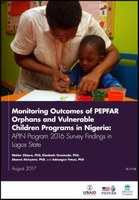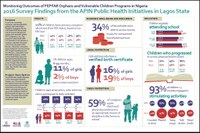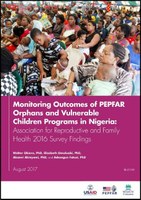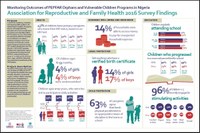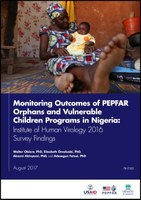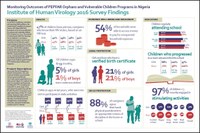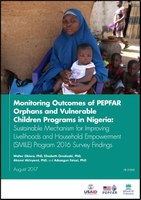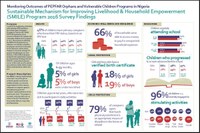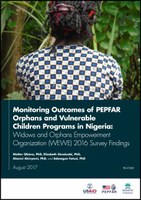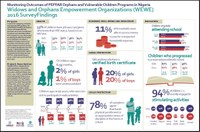Monitoring Outcomes of PEPFAR Orphans and Vulnerable Children Programs in Nigeria
Substantial investments have been made by the United States and Nigeria to improve the well-being of orphans and vulnerable children (OVC) and their households. However, not enough is known about the impact of this support regarding “what works” in improving OVC well-being (PEPFAR, 2012). To address this, PEPFAR in 2014 launched its new monitoring, evaluation, and reporting (MER) guidance with a set of outcome indicators for OVC programs. These outcome indicators reflect internationally accepted developmental milestones and collectively measure holistic well-being for children and their families over time. These outcome indicators are designated as essential survey indicators; PEPFAR considers them critical to track progress within PEPFAR-funded projects and has made them a reporting requirement. A standardized survey method and tools have been developed to collect these data in countries where PEPFAR is supporting OVC programs. PEPFAR/Nigeria has asked the USAID- and PEPFAR-funded MEASURE Evaluation project to conduct a survey to collect these indicators among five OVC projects. Conducting the MER OVC essential survey indicators supports the purposes of USAID’s evaluation policy for accountability and promoting learning to generate greater positive change. The MER OVC essential survey indicators’ technical guidance helps missions and implementing partners meet USAID’s evaluation policy requirements by encouraging the use of external data collectors for objectivity (unbiased measurement and reporting) and use of the best methods to generate high-quality data and credible evidence.
The purpose of collecting the MER OVC essential survey indicators is to obtain a snapshot of program outcomes at a point in time and to assess changes in outcomes among OVC program beneficiaries over time (a two-year period). The survey is not designed to assess outcomes among children in the general population. MEASURE Evaluation, in collaboration with USAID, United States Centers for Disease Control and Prevention (CDC), and the five OVC projects, conducted the MER OVC essential indicator survey in order to obtain the first snapshot of program outcomes in 2016 and will track two-year changes in outcomes in 2018.
The PEPFAR/Nigeria team selected five OVC projects in Nigeria to be surveyed out of seven USAID-funded projects and nine projects funded by the CDC. The five selected projects are:
- AIDS Prevention Initiative in Nigeria (APIN) Public Health Initiatives
- Association for Reproductive and Family Health (ARFH) Local Partners for Orphans and Vulnerable Children (LOPIN 1)
- Catholic Relief Services (CRS), Sustainable Mechanism for Improving Livelihoods and Household Empowerment (SMILE)
- Institute of Human Virology, Nigeria (IHVN)
- Widows and Orphans Empowerment Organization (WEWE) LOPIN

